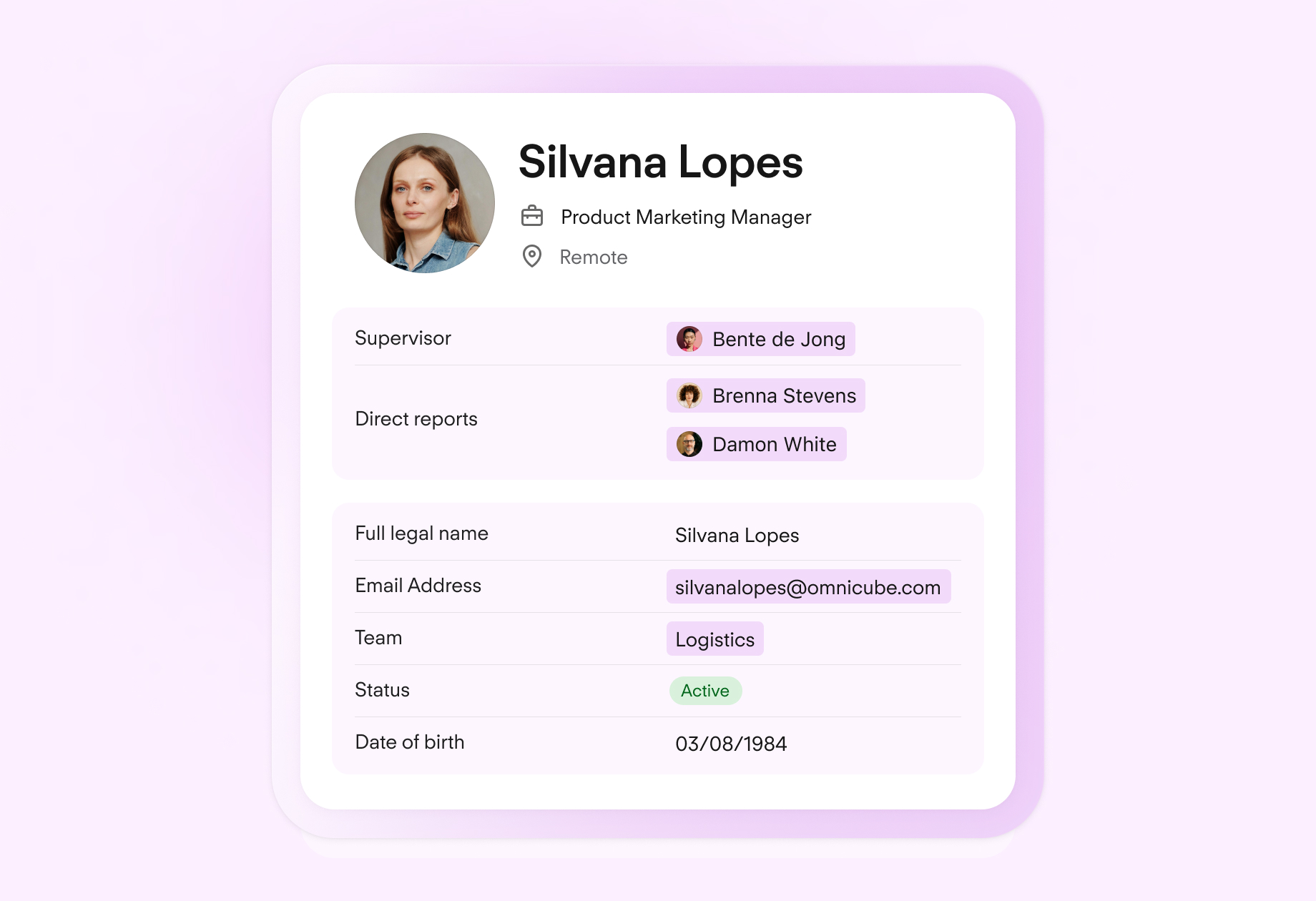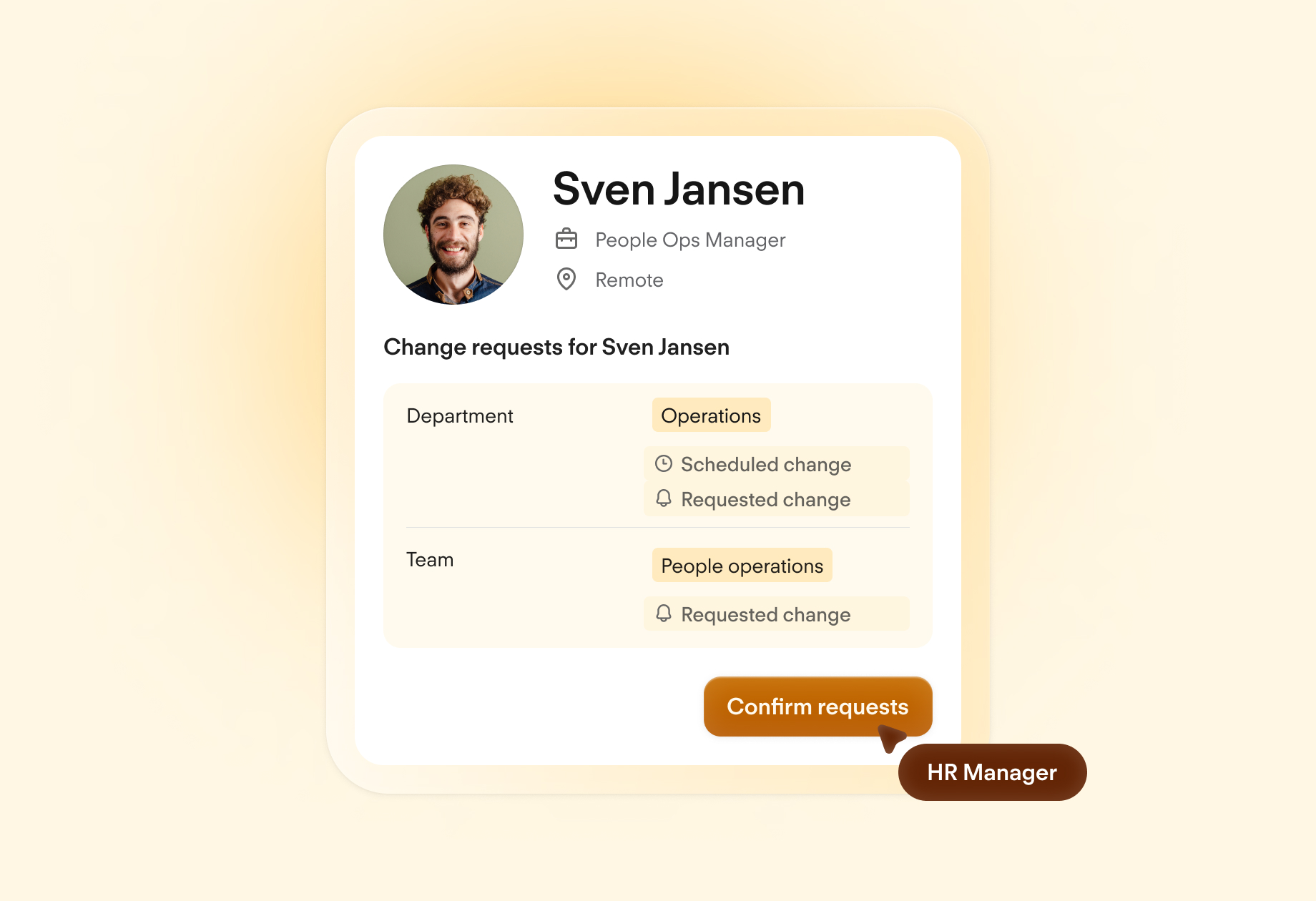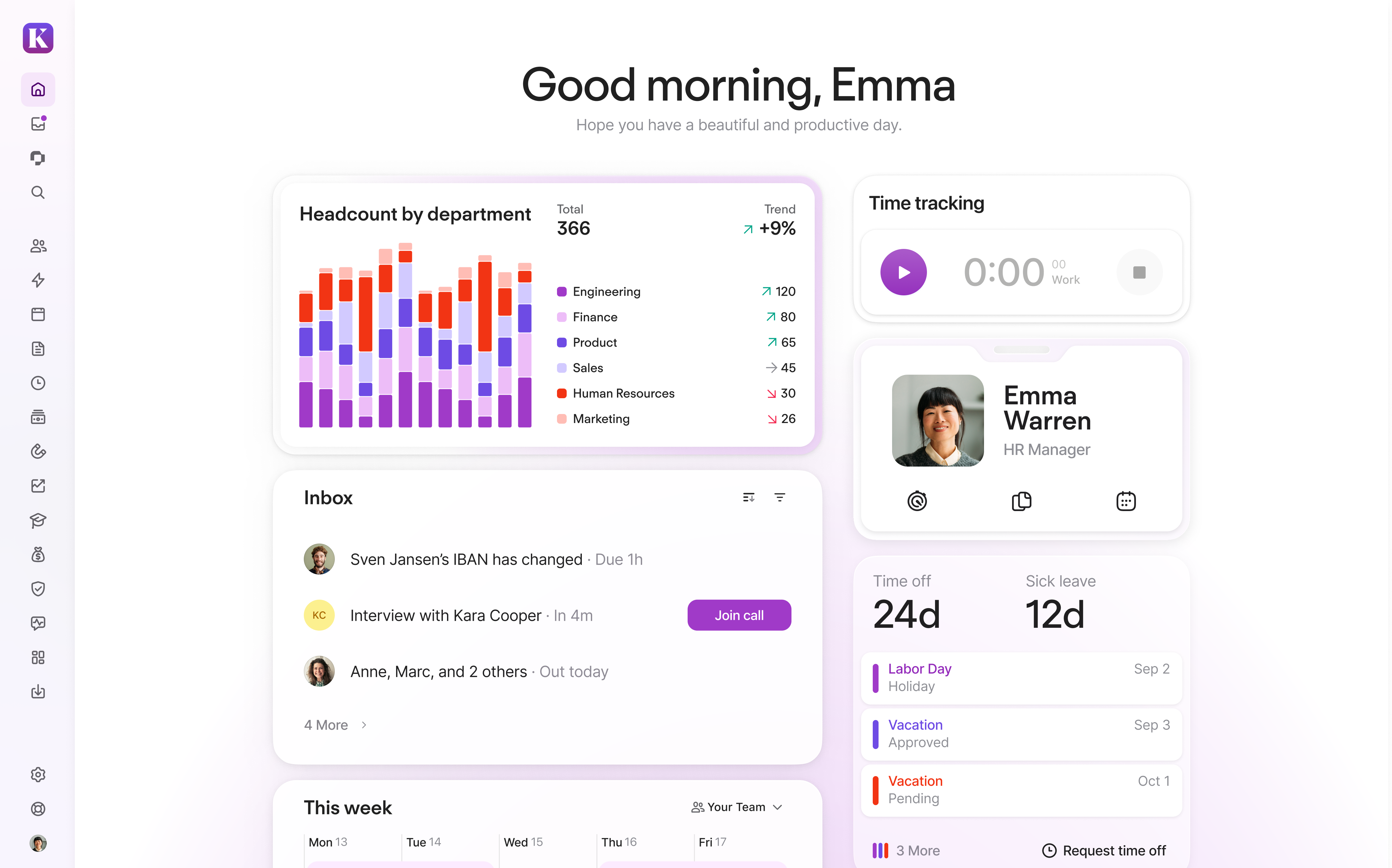
Full compliance from day one
Personio's airtight system offers a safe place for all of your employee data (with the innovation to match).
Find out moreLatest Blog Posts
How HRM software enhances compliance and data security

Chances are you didn’t go into HR because of a love for compliance paperwork. But managing compliance is an unavoidable and a critical part of the job. From labour laws and payroll to employee documentation and audits, HR teams are on the front line of data management and security to ensure the business stays legally compliant.
The challenge? Regulations are constantly evolving, data volumes are increasing, and the risks of breaches or fines are higher than ever. That’s why more organisations are using HR software to take the pressure off. These specialised tools help HR teams stay compliant with laws, secure employee information and automate manual processes that often lead to errors.
This page explores at how HR software supports data management, protection and security, the key features you need and how solutions like Personio makes compliance easier for HR teams.
How privacy laws impact HR data management
HR data management involves storing, processing, and securing private employee data from payroll and medical files to contracts and performance records. Every piece of this data is covered by strict laws like GDPR, in the workplace, HIPAA, or local employment regulations.
For example:
UK law only allows you to store recruitment data for as long as there’s a clear need. But the regulation doesn’t dictate how you dispose of it–you’re free to overwrite it, crypto shred it or destroy its storage device.
Hiring a single US-based employee brings you under HIPAA requirements.
Global organisations must manage compliance and data security across multiple jurisdictions.
The good news is that international privacy laws usually require similar basic security measures, which are:
Collecting only necessary employee information
Storing data securely with encryption and backups
Allowing employees to access or correct their records
Retaining or deleting records according to legal timelines
Failing to follow these rules can result in fines, audits, and reputational damage, making HR compliance software essential for day-to-day operations.
What is the role of HR in data management and security?
Effective HR management is often the first line of defence when it comes to enhancing data security. HR is responsible for implementing data protection laws and compliance requirements. That includes:
Managing employee records in line with legal obligations
Enforcing document retention and deletion rules
Tracking policy acknowledgement and digital signatures
Auditing payroll and contracts for accuracy and compliance
While you might not be a data protection officer you’re often the one choosing systems and developing processes for keeping your company safe.
But HR’s responsibility doesn’t stop there. You’re no doubt tasked with putting many of the data protection laws into practice at your organisation. That means researching all the relevant legislation, translating it into company policy and making sure everyone both understands and follows these rules.
What’s more, HR has to satisfy both privacy laws and employee demands. “The biggest challenge is the need to balance openness with security,” says Alisa Volynets, HR Business Partner at Rankup. “On the one hand, our culture cultivates transparency, but on the other, there are certain restrictions that don’t allow us to share all the data that interests employees.”
Why is data security important in HR?
Data security in HR isn’t just about avoiding fines. Privacy laws are in place to protect organisations and individuals from serious risks. Employee records include some of the most sensitive information in the business, from bank details to health records.
If mishandled, the risks include:
Identity theft and fraud
Stolen money or assets
Loss of access to data
Extortion
Poor data security can lead to penalties of up to £17.5 million or 4% of their annual profits. The UK government requires employers to implement robust security measures, like encrypting software and installing firewalls.
And poor security practices can quickly damage relationships with employees. As Alisa says, “Managing HR from a compliance perspective is not just a box-ticking exercise. It is important to understand that you are building trust with your team by ensuring that their personal information is handled responsibly.”
6 features HRM platforms need for data security and compliance
Not all HR management systems are built with compliance in mind. The right HR management software combine automation with advanced security to help HR teams manage data responsibly and stay ahead of regulations.
Here are the features to look for when choosing a solution.
1. Secure data collection
During onboarding, HR collects sensitive data such as bank details, IDs, and contracts. Without a centralised, secure system, this information may be exchanged through emails or spreadsheets – increasing the risk of leaks.
With employee self-service portal, employees submit their data securely, ensuring compliance with HR data management best practices.
As a bonus, self-service portals promote transparency and trust, as employees get visibility over exactly which information you collect and store on your system.
2. Secure data storage and encryption
As cyber-attacks become more frequent, you need to take stronger measures for protecting employee and company information.
Industry-standard encryption protects HR records from cyber threats and unauthorised access. Personio, for example, offers a combination of:
Transport Layer Security (TLS)
HTTP Strict Transport Security (HSTS)
AES 256
3. Data backup and recovery
If hackers or system failures cause a loss of access payroll histories, contracts, and employment, it can cause compliance failures.
Automated backups and recovery tools help HR to stay audit-ready and quickly recover from a data security incident.
To give employees peace of mind, Personio lets them create backups of their own files and documents, boosting their trust in how HR data is managed.
4. Strict access controls
HR compliance software should restrict access to sensitive data on a need-to-know basis. Key features include:
Role-based permissions: You assign roles to users such as administrator or manager and decide which areas of your system each one can access.
Password policies: This feature requires employees to create passwords that meet certain standards. For example, Personio rejects any passwords that are under eight characters long or only contain letters.
Multi-factor authentication: When teams log into their accounts, you can ask them to verify their identity by entering a code sent automatically to their device.
Single sign-on: You can allow individual employees to use the same credentials to sign into every work-related app, reducing the risk of forgotten passwords and shared accounts.
5. Compliance with the relevant local laws
Compliance isn’t one-size-fits-all. Leading HR compliance software adapts to GDPR, CCPA, and other regional laws.
Is your company expanding abroad? Personio automatically adjusts data privacy controls according to your location.
Take our absence management feature, for example. Personio automatically retains records based on each employee’s location, whether that’s for three years in the UK or six years in Germany.
6. Expert guidance
Data security isn’t a one-time task, and you have to constantly adapt your strategy to keep pace with technological advances and emerging threats.
The best HR compliance tools include:
Advice: Experts should be available 24/7 to help you navigate the security features, implement best practices and resolve issues like glitches and bugs. This ensures that you can quickly fix problems before they cause any system downtime, security vulnerabilities or holes in your compliance measures.
Incident reporting: There must be a protocol for reporting issues so security teams can quickly patch vulnerabilities or neutralise threats. For example, Personio launched a Bug Bounty program through our partnership with Intigriti so we can reward anyone who brings issues to our attention.
Proactive threat monitoring: Security teams should constantly check the system for issues. “Regular audits and data monitoring are just good practice,” says Tetiana Hnatiuk, Head of HR at Skylum. “Instead of waiting for data breaches, you should identify risks early on and prevent them.”
See how Personio helped Polaroid stay GDPR-compliant while reducing administrative burdens on HR staff.
Stay compliant and protect employee data with Personio

Worrying about data breaches and compliance issues shouldn’t keep you up at night. With Personio, you can rest easy knowing all your sensitive information is in good hands.
Personio’s range of security features–including the highest standard of encryption, regular data backups and centralised storage–keep your employee and company information safe.
Since many risks come from inside companies, Personio offers intuitive data access controls and password protection. Customisable role-based permissions mean your team only has access to the files they need to do their jobs.
No matter where your company hires, you can count on Personio to keep you compliant with local regulations. We automatically adjust features like time and absence management based on your location.
Leave data security and compliance to us so you can focus on what matters most: your people.
Discover secure HR software that helps you stay compliant

Personio’s specialised platform protects HR and employee data–keeping you compliant with relevant privacy regulations.
Maximise data security with Personio’s digital employee fileFAQs
What is HR compliance software?
HR compliance software helps HR teams follow labour laws and data security regulations. It automates tasks like record keeping, data retention, document management, and employees’ policy acknowledgement.
Why is compliance important for HR?
Compliance ensures payroll, contracts, and employee documentation meet legal standards. It reduces the risk of organisations being fined, protects employees’ rights and builds trust in HR by keeping sensitive data safe and secure.
What is data security and compliance?
Data security and compliance refers to the safeguarding practices required by law in your region or industry. It encompasses many aspects of data management, including how you collect, store and manage access to personal information. If you don’t follow these practices, you may leave your organisation vulnerable to security breaches and legal penalties.
What is compliance and human resources management?
Compliance and HR management is your strategy for making sure all your company’s policies and practices meet all relevant laws. Where HR data protection is concerned, it covers your processes for preventing the misuse, theft or unauthorised access of sensitive employee information. It also involves respecting employee rights: for example, by letting them view their files or informing them how you’ll use their data.
How do you respond to a data security incident in HR?
HR should follow an incident response plan that includes reporting the issue immediately, isolating affected systems, and restoring from backups. It’s also important to communicate to employees that their data is at risk.

